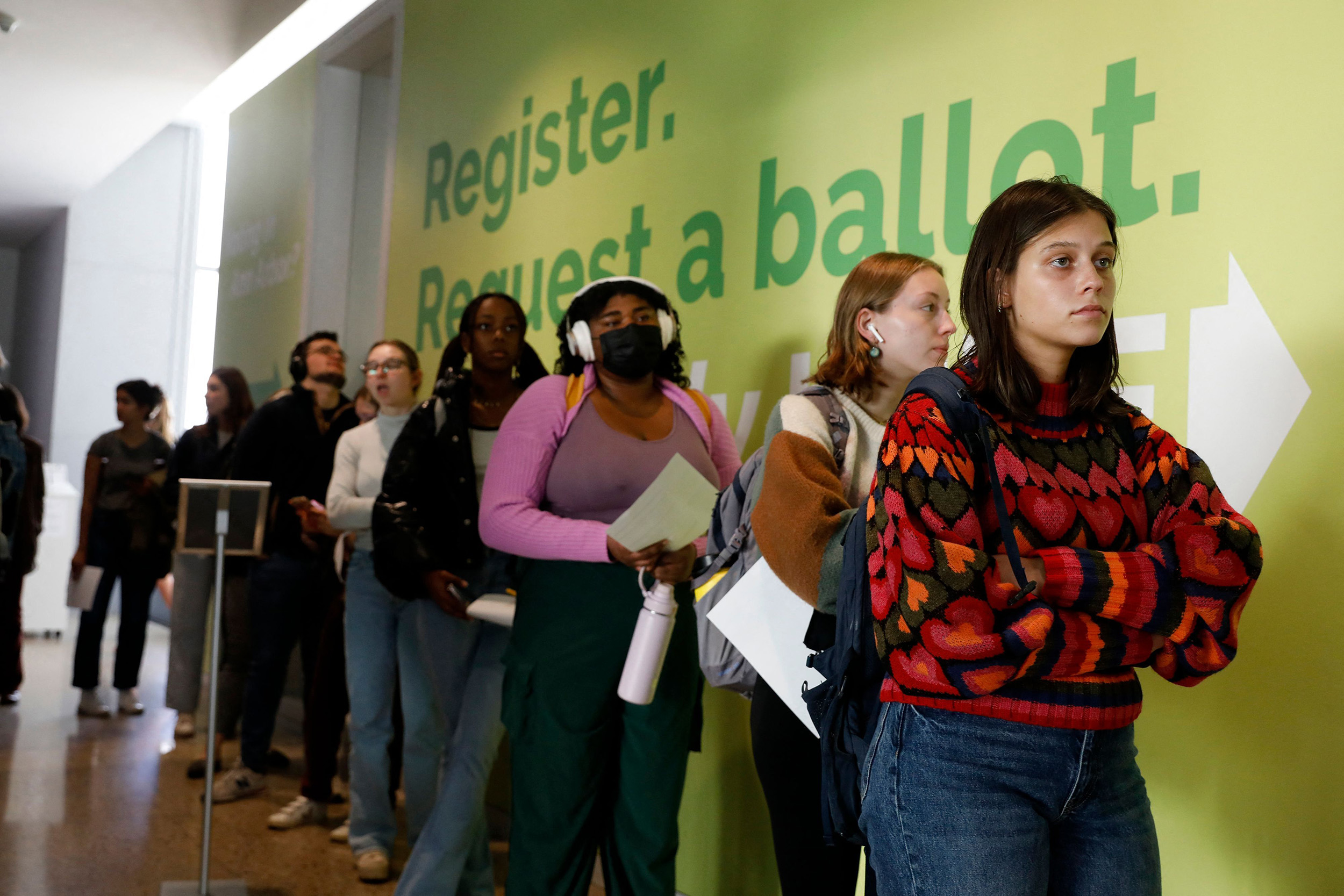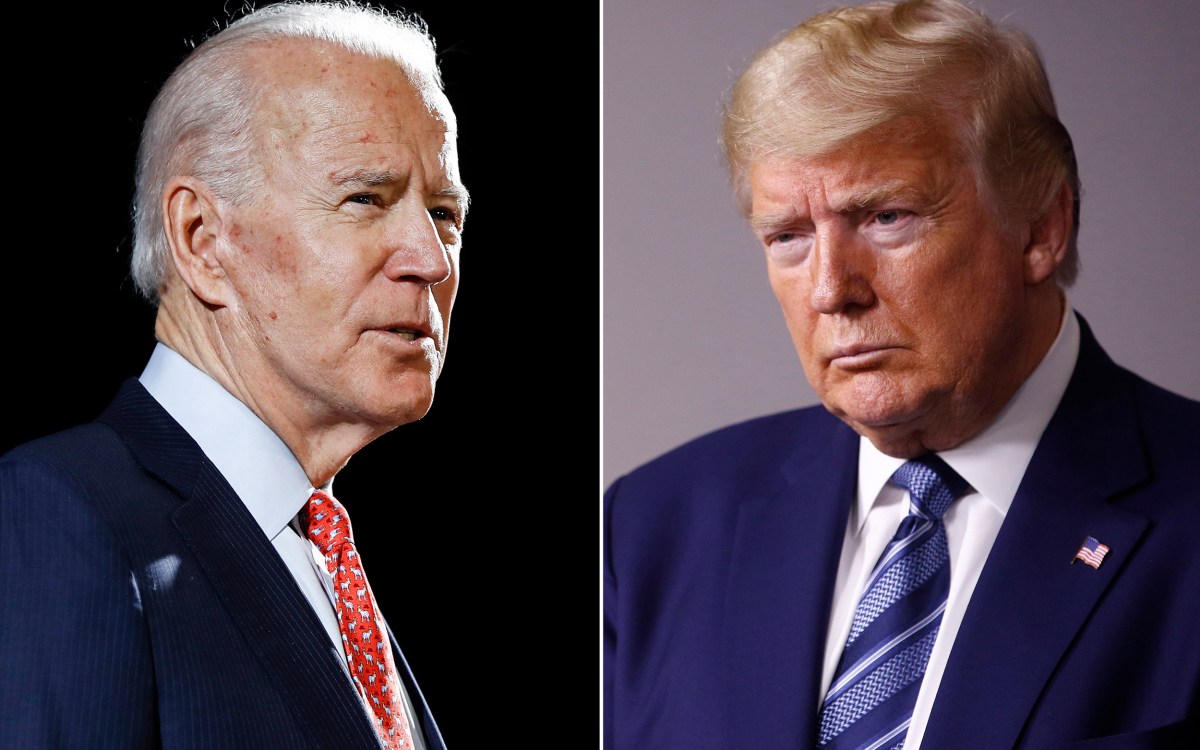
Young voters on the campus of University of Michigan line up to cast early ballots on the eve of the 2022 midterm elections.
Jeff Kowalsky/AFP via Getty Images
New IOP poll finds younger voters unenthusiastic on Biden-Trump rematch
Fewer feeling bullish on casting ballots, a potentially worrisome sign for Democrats, who benefited from 2020 surge
Gen Z and late Millennial voters turned out in record numbers in the 2020 election, providing a critical boost to Joe Biden’s victory over then-President Donald Trump. But a new poll released Dec. 5 from the Institute of Politics at the Harvard Kennedy School finds waning enthusiasm among younger voters for a Biden-Trump rematch, with more of them saying they may vote for a third-party candidate or just sit out the 2024 election, a troubling sign for the Democrats.
The number of younger Americans aged 18-29 who say they’ll “definitely” vote in the 2024 election has dropped from 57 percent to 49 percent since fall 2019, when the 2020 presidential election was still one year away, according to the poll. The falloff is most acute among Republicans and Independents/unaffiliated, whose eagerness to vote has dropped 10 points, from 66 percent to 56 percent, and from 41 percent to 31 percent, respectively. Likely voters among young Democrats dipped by 2 points.
“It’s clear from this poll that young people aren’t thrilled about facing the same choice in 2024 as they did in 2020,” said Ethan Jasny ’25, student chair of the Harvard Public Opinion Project, which publishes the Harvard Youth Poll twice yearly. The largest and oldest of its kind, the poll surveyed 2,098 Americans across the country between the ages of 18-29 from different educational, socioeconomic, and geographical backgrounds over two weeks in late October and early November.
The decline in interest was pervasive, surfacing across several demographic categories. Half of young Black and 56 percent of Hispanic/Latin Americans said in fall 2019 that they planned to vote; now only 38 percent of Black and 40 percent of Hispanic/Latin young people say the same.
Though college graduates remain eager to vote, college students and those who either didn’t graduate from college or are not in college appear less motivated to vote than students were four years ago. The percent of college students who plan to vote fell from 68 percent to 55 percent; from 48 percent to 40 percent among non-college grads, and from 56 percent to 46 percent for those not attending college.
That’s worrisome news for Biden, whose job approval rating with Americans of all ages hovers around the mid-30s. “The biggest threat for Biden is that young voters, who were key to his victory in 2020, and to Democratic victories in 2022 and 2023, will either vote third party or not vote at all,” Jasny said.
“The bad news is we have what looks like a depressed turnout at this stage relative to 2020. But the good news is, collectively, we have some ideas in terms of how to turn that around,” said IOP polling director John Della Volpe. Over the next 11 months, “It’s going to be conversations, communication about the importance of democracy, that democracy is working. It’s going to include information about the significant difference government can and has made for younger people over the last couple of years, [and] of course, we need to talk about the differences between the two parties.”


Why is this happening? A growing number of Gen Z and late Millennials are disenchanted with the two major political parties and don’t trust Trump or Biden, the two current front-runners to be their party’s nominee, to handle key issues that are important to them like gun violence, climate change, healthcare, crime, and the wars between Israel-Hamas and Russia-Ukraine, according to poll results.
More like this
Fewer young people call themselves Democrats today (35 percent) than they did four years ago (40 percent), and a growing number (38 percent) are now identifying as Independents or have no party affiliation.
While voting’s fading appeal is not good news for the Biden camp, the president still enjoys an 11-point lead over Trump among all 18-29 Americans, according to the poll. His lead over Trump climbs to 15 points (48 percent to 33 percent) among those registered to vote.
But when given the option to vote for someone other than Trump, Biden’s advantage over Trump takes a major hit, falling to just 4 points among young Americans, and to 8 points among registered voters. Contrary to other surveys, potential independent candidates, such as Robert F. Kennedy, Jr., Joe Manchin, and Cornel West, are pulling more young voters from Biden than Trump, the Harvard poll shows.
On the economy, 65 percent of younger voters say their own finances are in relatively good shape, but 70 percent believe the U.S. economy overall is doing poorly. Asked whom they trust to handle the U.S. economy, Trump is favored by 15 points over Biden.
The issue that may prove most consequential in determining whether young Americans head to the polls in 2024 is abortion. Support for access to reproductive health care, including abortion, has grown substantially, with 44 percent of young Americans saying abortion should be legal in all cases, an 8-point spike over 2016, when this question was last posed.
Fifty-three percent of young Americans label themselves “pro-choice” versus 26 percent identifying as “pro-life.” Among women, 90 percent of Democrats, 41 percent of Republicans, and 67 percent of Independents/unaffiliated said legal access to reproductive health care is “important.”
As more states ban or sharply curtail abortion access, the issue could drive up turnout for young Americans in 2024, with 45 percent polled saying they would “definitely” vote if there’s a referendum or ballot initiative in their state about the legality of abortion. The issue could have economic and social ramifications for the country in the future, with 69 percent of women and 55 percent of men saying access to reproductive health care, including abortion, is an “important” factor in choosing where to live.






